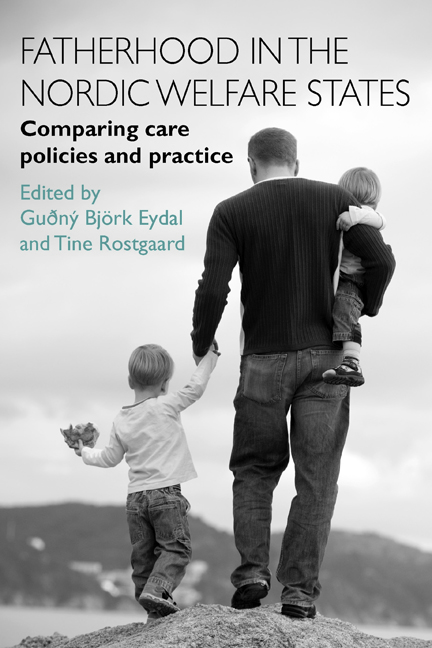Book contents
- Frontmatter
- Contents
- List of tables and figures
- Notes on contributors
- Acknowledgements
- one Introduction
- Theme 1 Fathers, families and family policies
- Theme 2 Fathers in everyday life – culture, work and care
- Theme 3 Constructing fatherhood in different family settings
- Theme 4 Caring fathers and paid parental leave policies
- Theme 5 International reflections on findings
- Conclusions
- Index
one - Introduction
Published online by Cambridge University Press: 04 March 2022
- Frontmatter
- Contents
- List of tables and figures
- Notes on contributors
- Acknowledgements
- one Introduction
- Theme 1 Fathers, families and family policies
- Theme 2 Fathers in everyday life – culture, work and care
- Theme 3 Constructing fatherhood in different family settings
- Theme 4 Caring fathers and paid parental leave policies
- Theme 5 International reflections on findings
- Conclusions
- Index
Summary
Aim and background
In 2007, an Icelandic play entitled ‘The Dad’ held its world premiere in Reykjavik, Iceland, and was well received by audiences and critics alike. Since then, the play has been translated into 10 languages and performed in 20 European countries. What prompts people in so many different cultures and countries to watch a one-man show about the male perspective on parenthood? One attraction seems to be its precise depiction of modern fatherhood. As playwright Bjarni Haukur Thorsson sees it, fatherhood practices are changing without any clear instruction manual, ‘We young fathers know so little, as our own fathers practised fatherhood in a very different way compared to what is expected of us. Women, on the other hand, seem to know what they’re doing. At least that's what it feels like’ (SVD Kultur, nd, authors’ translation).
Young fathers are less likely to model themselves on their own fathers; instead they must build their own fatherhood practices on what they as individuals believe is suitable. However, as the quote from Thorsson reveals, there are also certain societal expectations of the appropriate role and behaviours of these young fathers and how they should father their children. This book is about the practice of fatherhood and how expectations of fathers are formed in Nordic policymaking.
The aim of this book is to provide an insight into contemporary policies and practice of fatherhood in the five Nordic countries of Denmark, Finland, Iceland, Norway and Sweden. It may be no coincidence after all that a country in this region gave birth to such a widely acclaimed play on fatherhood. The Nordic welfare model is known in academic literature for its explicit support of and achievements regarding gender equality in both family and gender equality policies. An important part of the Nordic gender equality model is the facilitation of the labour market participation of both parents often referred to as the ‘adult worker model’ (see Lewis, 2001), where men and women are considered equally employable, working full time. This includes the Nordic emphasis on both parents sharing in the care of their children, as expressed in the dual earner/dual carer model (see, for example, Leira, 2006; Gornick and Meyers, 2009).
- Type
- Chapter
- Information
- Fatherhood in the Nordic Welfare StatesComparing Care Policies and Practice, pp. 1 - 20Publisher: Bristol University PressPrint publication year: 2014
- 1
- Cited by



